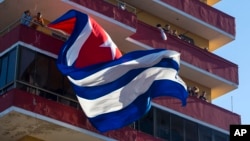The Cuban government has granted seven dissidents who are out of prison on parole one-time permission to travel outside the country in an apparent gesture to the United States ahead of a visit by President Barack Obama.
Four others in the same category were not granted the permission for reasons not immediately clear, dissidents reported.
U.S. critics of Obama's opening to Cuba have complained the president has received little in return for restoring diplomatic relations with the former Cold War enemy. To cement improving ties, Obama will visit Cuba on March 21-22.
Around the time of detente in December 2014, Cuba's Communist government released 53 people whom Washington considered political prisoners, but since then has resumed detentions. On average more than 700 people were detained short-term each month in 2015, according to the Cuban Commission of Human Rights and National Reconciliation.
Cuba considers the opponents a tiny minority that has lost legitimacy by accepting funding indirectly from the U.S. government.
The seven were summoned to the Interior Ministry and told they would be granted one trip abroad, though upon their return they would resume serving sentences out of prison with a ban on foreign travel.
"It appears to be some kind of gift they want to present to Obama, but in reality it is nothing concrete because when we come back we will return to legal limbo," said Martha Beatriz Roque, one of the 11.
They were among 75 opponents rounded up in the 2003 Black Spring crackdown.
With the intervention of the Roman Catholic Church and Spain, all 75 were released in 2010 and 2011 under the condition that they leave Cuba.
However, the 11 holdouts refused and opted to remain in prison rather than abandon their homeland. Eventually they were allowed to continue serving their sentences, which range from 18 to 25 years, while out of prison.
Among those denied travel permission was Jose Daniel Ferrer, leader of the Patriotic Union of Cuba, which claims 3,000 members, making it the largest dissident group in Cuba.
"It's a little gift ahead of the Obama visit for those seven. The other four, we were not were not even offered this little present because, according to the regime, those seven behave well and the four of us behave poorly, something we reject," Ferrer said.
U.S. officials were not immediately available for comment.
Cuba declines to comment on criminal justice matters.





